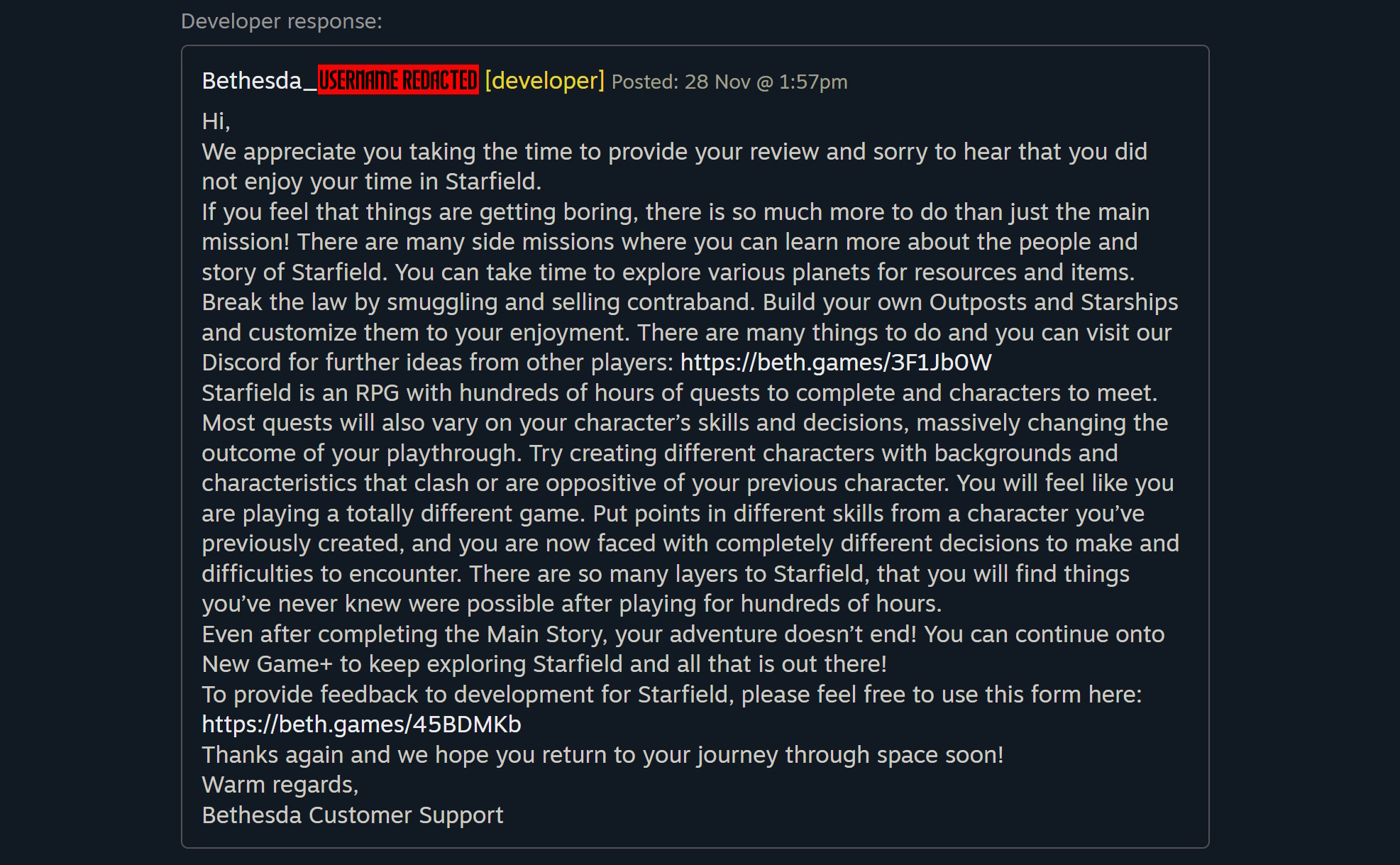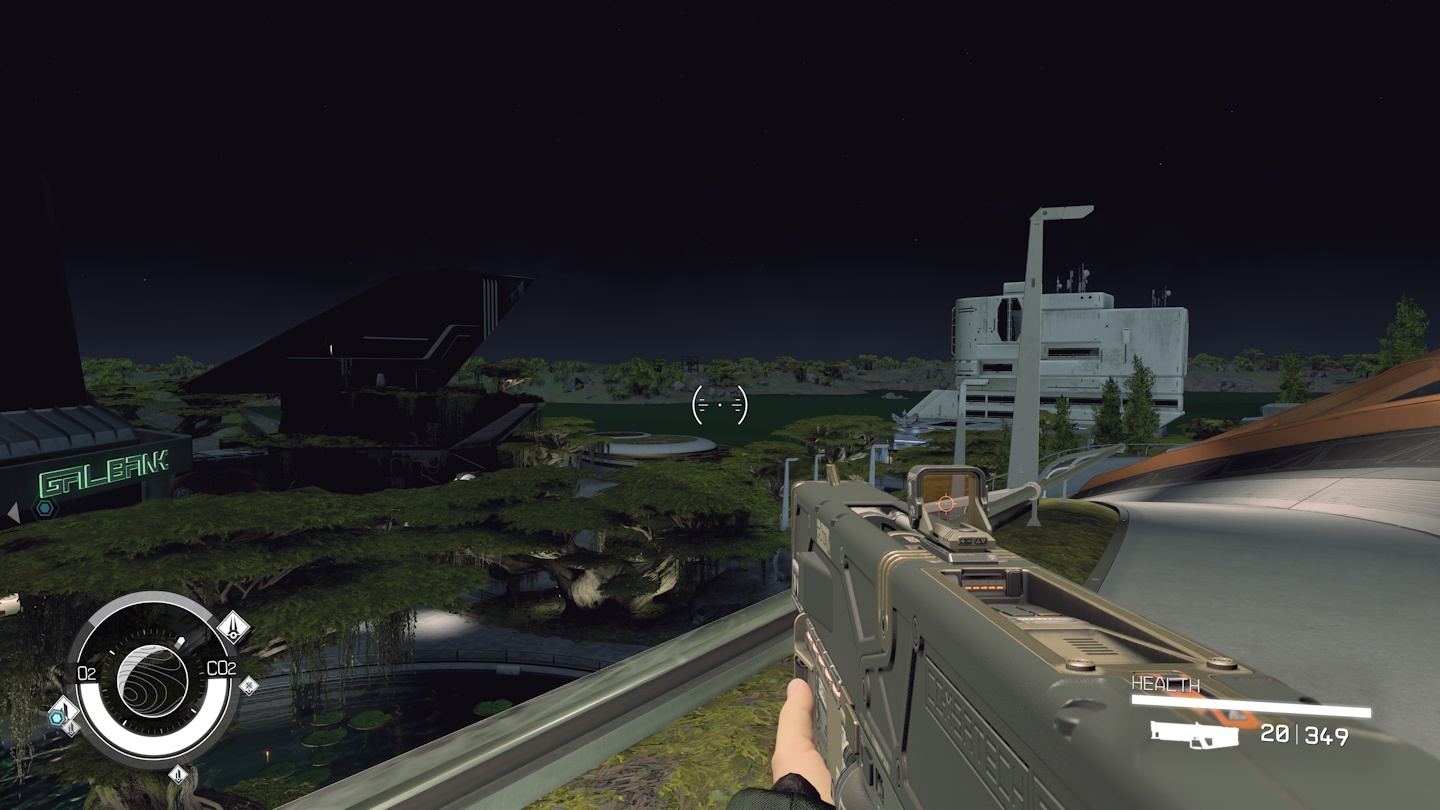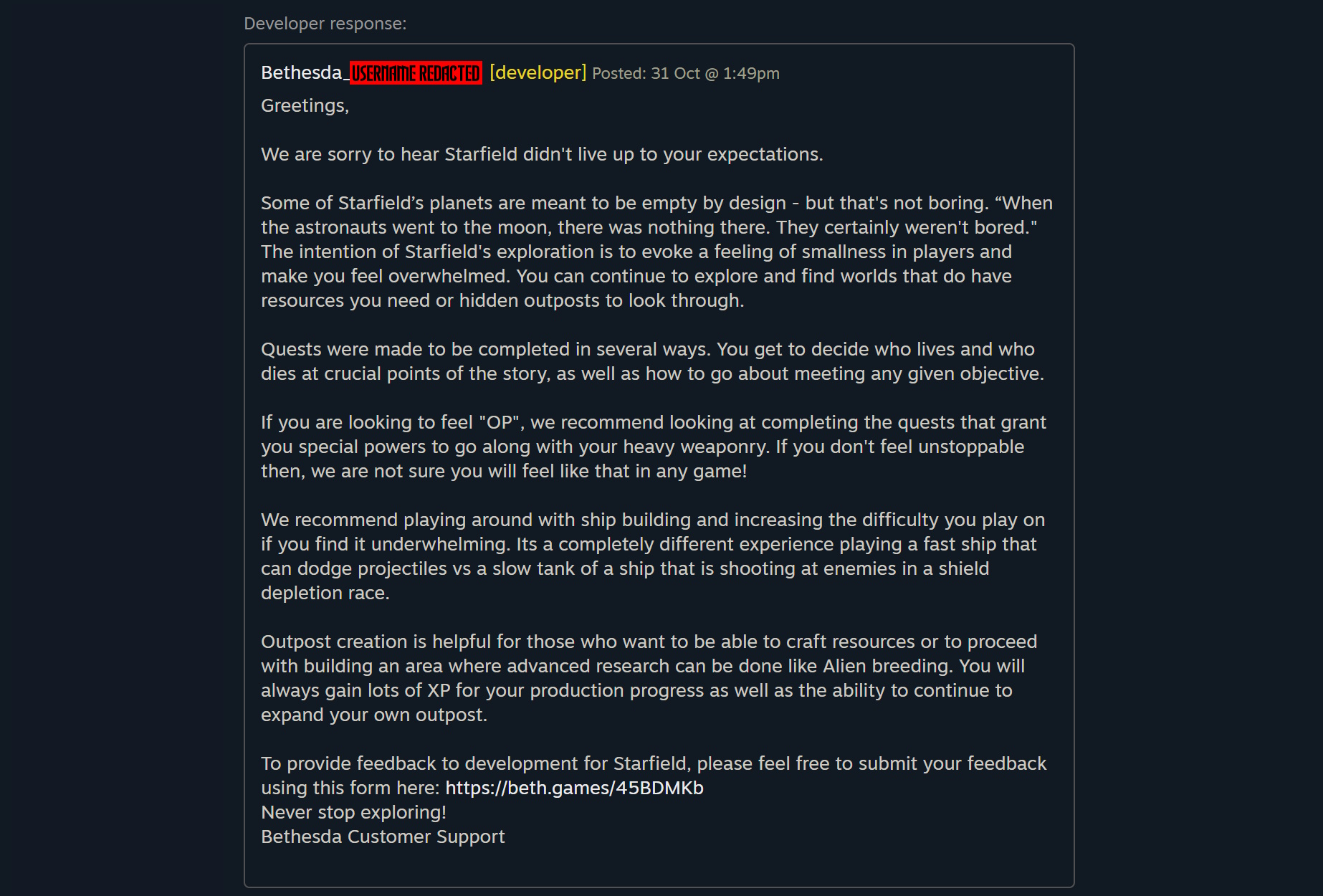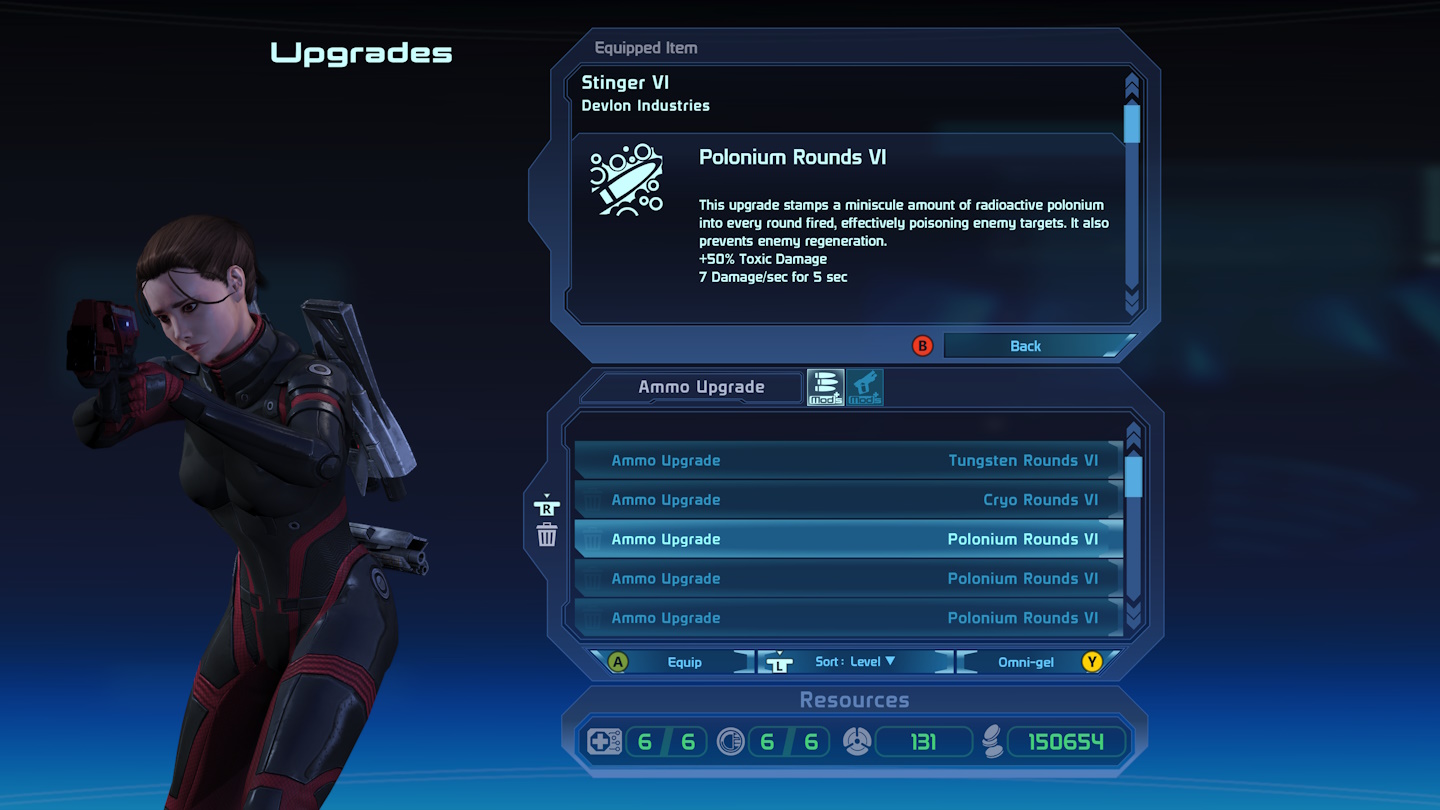Just when I thought I’d said everything I was ever going to say about Starfield…
Bethesda’s customer support/public relations team has had to handle some absolute nightmares over the past few years. The line “we aren’t planning on doing anything about it” in response to a complaint about the Fallout 76 “canvas bag” fiasco will be forever etched in my mind – and that’s just the start! I used to work in the games industry, specifically in marketing, so this kind of story is right up my alley… so to speak.
If you haven’t already heard, Bethesda’s PR team has begun posting replies to negative reviews on Steam… and it’s going about as well as you might expect.

(I have redacted the developer’s username for the sake of privacy.)
Here’s a great rule of thumb for any developer, publisher, or creative of any kind: don’t reply or respond to reviews. Ever. Period. End of story. Just don’t do it – it never goes well, and ends up coming across as whiny, arrogant, or both.
There are legitimate points of criticism in practically any work of media, and there are always going to be differences of opinion even among professional critics and journalists. A developer might think that they’ve made the “perfect” video game – but it’s a universal truth that even the absolute best of the best receive the odd negative review. Going after critics and players who have something negative to say is just a bad look – and it shouldn’t happen.

If Starfield was some obscure indie title made by a couple of amateur developers, I’d still encourage them never to reply to negative reviews – but I could at least understand, on a purely human level, where such responses were coming from. If a project that I’m passionate about and poured a lot of work into suddenly seems to be coming under attack, it’s natural to want to react to that, either to try to convince reviewers to change their minds or to “fight back.” It’s still a bad idea, but at least it’s understandable in that case.
But Bethesda is a big company, and it’s backed up by Microsoft – one of the largest and most valuable corporations on the planet. For these companies to literally pay some of their employees to use official Bethesda developer accounts to reply to negative reviews is just… well, it’s pretty shocking, to tell the truth.

(Developer username redacted.)
Whether you think Starfield is the “game of the year” or a dumpster fire, you have to accept that other people have different points of view. And Steam reviews are one way in which players can express their opinions about the game. A company the size of Bethesda has to accept that not every review can be positive – and they kind of have to take that on the chin when it happens. It’s a reality of the games industry.
The internet has democratised media criticism – and that’s a fantastic thing. No longer are reviews the sole domain of professional journalists with university degrees; anyone can now offer up their half-baked thoughts and opinions on films, games, and TV shows. And I think that’s absolutely wonderful. One of the best things that Steam does – and other platforms like Metacritic and Rotten Tomatoes do, too – is aggregating reviews, presenting audiences with an overall picture of how players feel about the titles on offer. No one individual review is, therefore, a deal-maker or deal-breaker; players are now able to consider a much broader range of opinions.

But the fact that any old idiot can set up a website – or post a review on a platform like Steam – means that not all reviews are going to be fair, accurate, or even relevant. Some reviews of Starfield criticised the game for absolutely silly reasons, and again on a human level, I can understand wanting to react to that and scream “it’s not fair!” But as a corporation, Microsoft has to be better than that. Bethesda and Xbox have to be professional.
Telling a player that they’re “wrong” to feel the way that they do about Starfield is bizarre – and it doesn’t do anything to endear Bethesda to its fans. Many reviews of Starfield echo my own thoughts on the game: people genuinely wanted to enjoy it, but found it to be visually last-gen, narratively weak, repetitive, and so on. Those criticisms may feel harsh to the talented developers who put a lot of time and effort into creating Starfield… but telling players that they shouldn’t feel that way or they just “don’t get” what Starfield was meant to be is an incredibly silly way to react.

There are two good ways to respond to criticism. Firstly, Bethesda and Xbox can prioritise fixing commonly-noted issues with the game. Rolling out updates and patches that, for example, improve the quality of the in-game map or reduce the frequency of copy-and-paste levels and environments would be a good place to start. Saying to players “we hear your concerns and we’re acting on them” is the appropriate reaction.
Look at what Hello Games did when No Man’s Sky came in for some absolutely ruthless criticism upon launch. Instead of lashing out at players, telling them to appreciate what the game had to offer, they knuckled down and got back to work. That game has received more free updates and patches than I can count – and it’s now in a far better and more enjoyable state than it was when it launched. Hello Games prioritised adding features that players wanted and fixing issues that players criticised – and the result is that, several years later, the game can claim to have made a comeback.

The second way to react to criticism is to make sure that the things players don’t like won’t be present in the next game a studio creates. While I personally wasn’t offended by Starfield’s abundance of loading screens, it’s one of the most common complaints about the game that I’ve read over the past couple of months. I don’t believe it’s possible to remove the loading screens in Starfield – thanks to the game’s reliance on the outdated Creation Engine that Bethesda has been using, in some form, for close to a quarter of a century – but it *is* possible for Bethesda to acknowledge the way players feel about loading screens and ensure that they won’t be present to the same extent in The Elder Scrolls VI.
Although the first Mass Effect game was well-received, it picked up criticism in 2007 for its inventory management and weapon overheating. By the time Mass Effect 2 rolled around a few years later, those problems had been fixed. Inventories were streamlined, weapon overheating was gone, and players had a much better time with the game. BioWare took those criticisms on board and worked to ensure that the things players didn’t like were gone from the next game in the series.

When Bethesda responds to criticisms of Starfield being “boring” – in the subjective opinion of one player – by saying things like “When the astronauts went to the moon, there was nothing there. They certainly weren’t bored.” it feels incredibly arrogant and smug. Trying to shut down “wrong” opinions about the game by attacking players – some of whom spent dozens or hundreds of hours playing before leaving their reviews – is genuinely shocking coming from a major studio. I’ve never seen anything quite like it, in fact – not on this scale, at any rate.
So Bethesda, here’s some free advice from someone who used to work in video games marketing: just stop. Stop what you’re doing – and if possible, apologise to the players you attacked. Refrain from ever responding to reviews again, and take the criticism as it comes. Even if you’d made an impossibly perfect game, there’d still be some people who didn’t like it or felt it wasn’t for them. That’s the way it goes, and you can’t afford to be so thin-skinned in this marketplace! You are doing actual damage to your reputation by retaliating in this way – so stop it.

What a mess, eh?
I really felt that I was done talking about Starfield until this came along. I was quite content to put the game back on the shelf, perhaps returning to it in a year or two to see if expansion packs and updates had improved it. But never in a million years did I expect to see Bethesda lashing out in this way. It’s unprofessional, petty, thin-skinned, and just plain wrong. It has done nothing to address legitimate points of criticism of the game, nor has it helped the reputations of either Starfield or Bethesda itself. I’m genuinely shocked to see this.
Somewhat ironically, given Starfield’s copy-and-paste buildings and “points of interest,” at least some of these reviews seem to have themselves been copied-and-pasted… or perhaps written by an AI bot. I hope Bethesda learns another lesson from this mess and doesn’t keep up this attack on critics of Starfield. No matter how great you might think the game is, and how much fun you had with it, you have to concede that not everyone feels the same way, and that there are genuine reasons to be dissatisfied, underwhelmed, or even downright pissed off at Starfield.
Do better, Bethesda.
Starfield is out now for PC and Xbox Series S/X, and is also available via Game Pass. Starfield is the copyright of Bethesda Game Studios, Xbox Game Studios, and Microsoft. This article contains the thoughts and opinions of one person only and is not intended to cause any offence.

